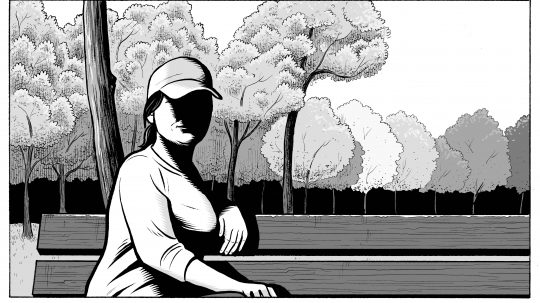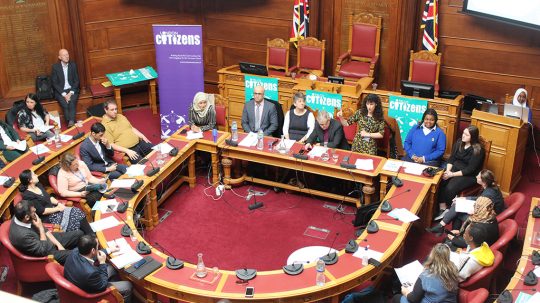
Stephen Stone: It's a school that's been around in Glasgow in this area for over 90 years. So it's a well-established school.
The families in this school have a real affinity with St. Roch's and they identify with the school to a great extent. The benefit of that is that for us and our pupils, we've got parents and grandparents who were all pupils at the school so there's a real feeling of belonging to something, when the pupils come into St. Roch's.
Almost 90% of our pupils are in SIMD [Scottish Index of Multiple Deprivation] one or two which is the 20% most deprived postcodes in Scotland. And the fairly small number that we have outwith those two deciles really come from outlying areas to come into St. Roch's because of, for example, our deaf provision. Where we'll have deaf pupils travelling from across Glasgow or from outwith the Glasgow area into the school for that. So an area where the families are dealing with very, very difficult, challenging situations on a daily basis. And that's a backdrop to a lot of our pupils lives, and for many of our young people, the fact that they can get here, every day and get here ready to work and ready to learn is a huge step and is a real major success in itself.
Exclusion from school would only be an absolute last resort. And it's easy to say that, but the evidence shows that because in the last four or five years our figures for pupils being excluded have been in single digits for the whole year, for the whole school. Last year, I think it was four, it's varied between maybe four, six, seven, over the last four or five years. Whereas previously, in many Glasgow schools the figures for pupils being excluded, were 10 times, 20 times that figure. So the evidence shows that we are working in a way where exclusion for us is not an option. That's the default position, is we don't exclude pupils. It doesn't resolve any issues. It just kicks it down the street a wee bit and the issues that caused the problem there are still going to be there in two days or three days or four days. So for us, that's not a solution, it doesn't fix anything, it doesn't make anything better.
In fact, when the pupil then comes back in having missed another three, four days of schooling then they are then behind their class. And so you've got to add that problem and that barrier onto whatever issue there was, whatever barrier there was. Exclusion is a cycle of failure, and we want to break that cycle. And we do that by adopting an inclusive approach and a supportive approach.
There are lots and lots of ways in which we do that. For example, attendance, we think is the single most important factor in terms of engagement and attainment for pupils because if they're not in school, they're not learning. So for us, attendance is a big, big issue and for maybe the last seven, eight years we've been among the top two or three attended schools in Glasgow. A school of 600 teenagers, so you know, incidents do happen like they do in all schools.
But the starting point is to have a positive climate in the school and a calm atmosphere in the school, because that feeds into positive relationships. And so what we achieve through that is that, although there are incidents, they tend to be infrequent. They're few and far between. And so they're much easier to deal with, because everybody involved; the teacher, the young person, the parent, everybody involved can see that it's an unusual situation. That gives us a starting point for conversation. Why is that? Why did that happen? You know, what was the problem there? And then talk through it.
And if you talk to people, including young people, and you listen to them, then I think that's a big part of the battle, then you can resolve issues. You can identify what an issue is and then find a way to come together to make it better, I think that's really what it comes down to. Every year all schools have to account for the destinations or the pupils moving on from the school, whether that's to university or college, or a job or a place in our training programme. These are all positive destinations, as opposed to being unemployed, either unemployed, seeking work or not seeking work which are negative destinations. And we've been working really hard in the school to achieve 100% positive destinations, which as you'd imagine is hugely challenging, and some would say is impossible. And therefore it's really, really important that while the pupil in school that we're working hard to get them into the right destination for that pupil. If we have supports that are in place, for most pupils, we are failing. We have to have supports that are in there for the pupils of our school, every single one of them. And some of them need more support than others. Some of them need very little support in terms of getting through school and achieving really well. And that's fantastic. And other schools need a lot more.
And there's been a big push, of course, in Glasgow and beyond about equity, and it's not about giving everyone the same level of support, or the same supports, it's about giving everybody the right level of support, and the right support for them to overcome the barriers and the issues that they face. So the Nurture programme, and we have specially trained staff who implement that programme, will support young people whose home lives may be very challenging or for whom, school itself is a real challenge and they need some extra support. And that may be a broad support of life skills, they come in in the morning, maybe have some breakfast. The chance to relax a wee bit before school and to get themselves into a good frame of mind to learn and to have positive frame of mind to learn for that day. It might be that there are some subjects that some pupils find extremely difficult or too much of a challenge. And we can withdraw them from certain subjects and give them extra support in certain other subjects where they will do well with that wee bit more support, or it might be that they come out and they have some individual time, support time, that's structured carefully and with a programme based around what their particular needs are.
We also have a programme for our younger pupils called CIA, Children's Intelligence Agency it is and it's for people who are particular high achievers. And so it's to support them and really stretch them and it might be some after school work in certain subject areas or in a broader sense, general support time for them. Our school and all schools in Glasgow and across Scotland qualify for funding from the Pupil Equity Fund. And it's an amount of money which is given to schools based on the level of deprivation faced by the pupils in that school, and in that area.
The rationale behind the PEF funding, as it's called, is that it's an attempt to reduce the poverty related attainment gap across the country. Because for years, it's been evident that pupils from more affluent backgrounds tend to perform better and then have better opportunities in school and beyond school. Part of that might be for example, bringing more staffing in because there's always that concern about is this more work, and we're already working so hard, how can you ask us to do something else? One way that we can try and cushion that effect is to bring in extra members of staff, for example, to work for two days a week, and through bringing that member of staff in, you can increase capacity in a particular subject area. Maybe enable you to split classes and have smaller groups, or to extract pupils who are just on the cusp of two different levels to try and give them that extra support.
We have a really strong system of pastoral care in the school, we have a horizontal system, which means that we have a pastoral care teacher responsible for all pupils in a certain level. So we have one pastoral care teacher for all pupils in S1 and S2. Another pastoral care colleague looks after pupils in S3 and S4. So that's pupils coming to the end of their BGF, which is a Broad General Education and into the senior phase, which starts in S4. And we have one looking at S5 and S6, and that pastoral care teacher will have responsibility for supporting those pupils as they move towards the end of the time in school. And then a real focus on positive destinations and transition support work for college, university courses, and so on. We also have an extra 0.6 pastoral care teacher who will have specific areas of responsibility. Not a case load in the same ways that other teachers do but maybe an overview or, for example, the Nurture programme in school, or looking after our care-experienced young people.
We have an extensive deaf provision in the school and it's Glasgow's specialist deaf provision. And last year the figure was maybe about 38, 39, maybe about 35 deaf pupils at the moment. And that will be pupils who have a range of hearing impairment, they may be, for example, profoundly deaf. In most cases, they're not profoundly deaf, but they have hearing loss to different degrees. The great thing for those pupils is they can come to St. Roch's and be part of a mainstream environment. So they have specialist support within the mainstream environment. Some of those pupils will receive their teaching and learning in small groups within the Deaf-Ed department. But most of those pupils will access at least part of their curriculum in mainstream classes with support. The great thing for those pupils is they are accessing a mainstream education provision with all the supports that we have in place and the breadth of opportunities that that will present to pupils. But for all of our pupils, or hearing pupils especially, then it raises awareness and issues around tolerance and acceptance and inclusion and inclusion is one of our school values.
The key I think, to having an inclusive, a genuinely inclusive school is the relationships and the emphasis on building strong relationships in the school. It means you have teachers and support staff, who are working hard with young people and with families. You have young people who love the school. You have parents and carers who wouldn't dream of sending their children to any other school, because they actually love the school. So there's a lot to be said for a lot. So a school which is respectful, which listens to people, which has strong relationships at its core, gives you the chance of having a really strong, successful school. And hopefully a school where people enjoy coming. And they use as a platform to a really great life beyond school.



